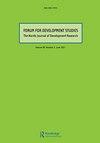Utilization of Social Capital in Managing Family Planning Village Programs in Rural Communities in Indonesia
IF 1.1
Q3 DEVELOPMENT STUDIES
引用次数: 0
Abstract
Abstract This article aims to analyze the existing social capital in the community and elaborate on it through community empowerment to manage the family planning village. Communities in rural areas have a variety of potential social capital that can be utilized in implementing the KB village program. Utilization of social capital such as bonding, bridging and linking becomes effective through values, norms, culture, social organizations that exist in society local. The approach used in this study is a mixed-method. The mixed research method used is descriptive qualitative and quantitative approaches. This research was conducted in 3 sub-districts in 3 villages in Deli Serdang Regency, North Sumatra Province, where the purposively selected villages are villages that run the Family Planning Village Program. The ethnicity of the people in these three villages has different characteristics. The people of Marunjuk Tongah Village are dominated by the Batak Karo ethnic group and the Protestant Christian religion. Islam and Javanese ethnicity dominate Tanjung Rejo Village and Kramat Gajah Village. Sociologically, the social ties of the people in this village come from ethnic and religious similarities, similar places, and blood similarities. Social bridging aspects can be seen in the culture of mutual assistance and community involvement in village activities. Social linking can be seen in establishing cooperative relationships and continuity between the community and formal and non-formal government institutions. The potential for social capital developed by the Family Planning Village administrators is the harmonization of village communities. Rural communities can improve the Family Planning Village program and village development implementation. The use of social capital has been well implemented in managing the Family Planning Village program through community empowerment activities. Understanding the potential of community social capital is an important first step in carrying out community empowerment and physical or social development in society.印度尼西亚农村社区计划生育村项目管理中的社会资本利用
摘要本文旨在分析社区现有的社会资本,并通过社区赋权对计划生育村进行管理。农村地区的社区拥有各种潜在的社会资本,可用于实施KB村计划。社会资本的利用,如纽带、桥梁和联系,是通过社会本地存在的价值观、规范、文化、社会组织来实现的。本研究使用的方法是混合方法。使用的混合研究方法是描述性定性和定量方法。本研究在北苏门答腊省Deli Serdang县的3个村庄的3个街道进行,其中有意选择的村庄是实施计划生育村项目的村庄。这三个村庄的民族各有特点。Marunjuk Tongah村的人主要是Batak Karo民族和新教基督教。伊斯兰教和爪哇族主要是Tanjung Rejo村和Kramat Gajah村。在社会学上,这个村子里的人们的社会联系来自种族和宗教的相似性,相似的地方,和血统的相似性。社会桥梁方面可以从互助文化和社区参与村庄活动中看到。在社区与正式和非正式政府机构之间建立合作关系和连续性可以看出社会联系。计划生育村管理者所开发的社会资本的潜力是村社区的和谐。农村社区可以完善计划生育村规划和村庄发展实施。通过社区赋权活动,很好地利用了社会资本来管理计划生育村项目。了解社区社会资本的潜力是在社会中实施社区赋权和物质或社会发展的重要第一步。
本文章由计算机程序翻译,如有差异,请以英文原文为准。
求助全文
约1分钟内获得全文
求助全文
来源期刊

FORUM FOR DEVELOPMENT STUDIES
DEVELOPMENT STUDIES-
CiteScore
1.80
自引率
14.30%
发文量
24
期刊介绍:
Forum for Development Studies was established in 1974, and soon became the leading Norwegian journal for development research. While this position has been consolidated, Forum has gradually become an international journal, with its main constituency in the Nordic countries. The journal is owned by the Norwegian Institute of International Affairs (NUPI) and the Norwegian Association for Development Research. Forum aims to be a platform for development research broadly defined – including the social sciences, economics, history and law. All articles are double-blind peer-reviewed. In order to maintain the journal as a meeting place for different disciplines, we encourage authors to communicate across disciplinary boundaries. Contributions that limit the use of exclusive terminology and frame the questions explored in ways that are accessible to the whole range of the Journal''s readership will be given priority.
 求助内容:
求助内容: 应助结果提醒方式:
应助结果提醒方式:


